
Gregory Gallant, better known by his pen name Seth, is a Canadian cartoonist. He is best known for his series Palookaville and his mock-autobiographical graphic novel It's a Good Life, If You Don't Weaken (1996).
An autobiographical comic is an autobiography in the form of comic books or comic strips. The form first became popular in the underground comix movement and has since become more widespread. It is currently most popular in Canadian, American and French comics; all artists listed below are from the U.S. unless otherwise specified.
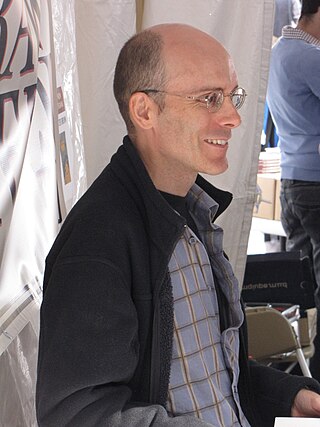
Chester William David Brown is a Canadian cartoonist. Brown has gone through several stylistic and thematic periods. He gained notice in alternative comics circles in the 1980s for the surreal, scatological Ed the Happy Clown serial. After bringing Ed to an abrupt end, he delved into confessional autobiographical comics in the early 1990s and was strongly associated with fellow Toronto-based cartoonists Joe Matt and Seth, and the autobiographical comics trend. Two graphic novels came from this period: The Playboy (1992) and I Never Liked You (1994). Surprise mainstream success in the 2000s came with Louis Riel (2003), a historical-biographical graphic novel about rebel Métis leader Louis Riel. Paying for It (2011) drew controversy as a polemic in support of decriminalizing prostitution, a theme he explored further with Mary Wept Over the Feet of Jesus (2016), a book of adaptations of stories from the Bible that Brown believes promote pro-prostitution attitudes among early Christians.
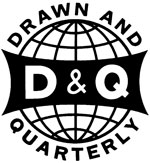
Drawn & Quarterly (D+Q) is a publishing company based in Montreal, Quebec, Canada, specializing in comics. It publishes primarily comic books, graphic novels and comic strip collections. The books it publishes are noted for their artistic content, as well as the quality of printing and design. The name of the company is a pun on "drawing", "quarterly", and the practice of hanging, drawing and quartering. Initially it specialized in underground and alternative comics, but has since expanded into classic reprints and translations of foreign works. Drawn & Quarterly was the company's flagship quarterly anthology during the 1990s.

It's a Good Life, If You Don't Weaken is a graphic novel by Canadian cartoonist Seth. It appeared in a collected volume in 1996 after serialization from 1993 to 1996 in issues #4–9 of Seth's comic book series Palookaville. The mock-autobiographical story tells of its author's obsessive search for the work of a fictional forgotten cartoonist.

Douglas Austin Wright was a Canadian cartoonist, best known for his weekly comic strip Doug Wright's Family. The Doug Wright Awards are named after him to honour excellence in Canadian cartooning.

The Doug Wright Awards for Canadian Cartooning are literary awards handed out annually since 2005 during the Toronto Comic Arts Festival to Canadian cartoonists honouring excellence in comics and graphic novels published in English. The awards are named in honour of Canadian cartoonist Doug Wright. Winners are selected by a jury of Canadians who have made significant contributions to national culture, based on shortlisted selections provided by a nominating committee of five experts in the comics field. The Wrights are handed out in three main categories, "Best Book", "The Spotlight Award", and, since 2008, the "Pigskin Peters Award" for non-narrative or experimental works. In 2020, the organizers added "The Egghead", an award for best kids’ book for readers under twelve. In addition to the awards, since 2005 the organizers annually induct at least one cartoonist into the Giants of the North: The Canadian Cartoonist Hall Fame.

I Never Liked You is a graphic novel by Canadian cartoonist Chester Brown. The story first ran between 1991 and 1993 under the title Fuck, in issues #26–30 of Brown's comic book Yummy Fur; published in book form by Drawn & Quarterly in 1994. It deals with the teenage Brown's introversion and difficulty talking to others, especially members of the opposite sex—including his mother. The story has minimal dialogue and is sparsely narrated. The artwork is amongst the simplest in Brown's body of work—some pages consist only of a single small panel.

The Canadian Cartoonist Hall of Fame, formally known as Giants of the North: The Canadian Cartoonist Hall of Fame, honours significant lifelong contributions to the art of cartooning in Canada.

James Sturm is an American cartoonist and co-founder of the Center for Cartoon Studies in White River Junction, Vermont. Sturm is also the founder of the National Association of Comics Art Educators (NACAE), an organization committed to helping facilitate the teaching of comics in higher education.
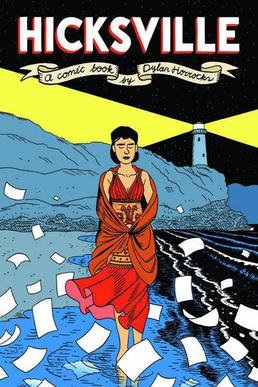
Hicksville is a graphic novel by Dylan Horrocks originally published by Black Eye Comics in 1998. The novel explores the machinations of the comic book industry, and contains a slightly fictionalized account of the history of mainstream American comics, with particular attention paid to the era of Image Comics.
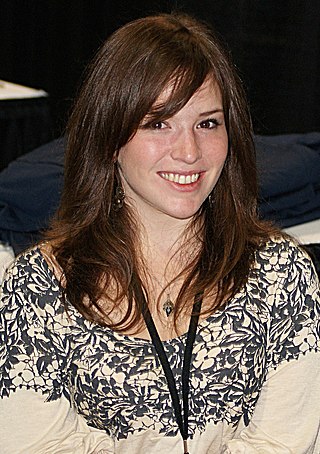
Kathryn Moira Beaton is a Canadian comics artist best known as the creator of the comic strip Hark! A Vagrant, which ran from 2007 to 2018. Her other major works include the children's books The Princess and the Pony and King Baby, published in 2015 and 2016 respectively. The former was made into an Apple TV+ series called Pinecone & Pony released in 2022 on which Beaton worked as an executive producer. Also in 2022, Beaton released a memoir in graphic novel form, Ducks: Two Years in the Oil Sands, about her experience working in the Alberta oil sands. Publishers Weekly named Ducks one of their top ten books of the year.

Comics journalism is a form of journalism that covers news or nonfiction events using the framework of comics, a combination of words and drawn images. Typically, sources are actual people featured in each story, and word balloons are actual quotes. The term "comics journalism" was coined by one of its most notable practitioners, Joe Sacco. Other terms for the practice include "graphic journalism," "comic strip journalism", "cartoon journalism", "cartoon reporting", "comics reportage", "journalistic comics", and "sketchbook reports".
Canadian cartoonist Chester Brown attracted the attention of critics and peers in the early 1990s alternative comics world when he began publishing autobiographical comics in his comic book Yummy Fur. During this period Brown produced a number of short strips and two graphic novels: The Playboy (1992) and I Never Liked You (1994). The personal and revealing deal with Brown's social awkwardness and introversion, and the artwork and page layouts are minimal and organic. In 2011 Brown returned to autobiography with Paying for It, an account of his experience with prostitutes.
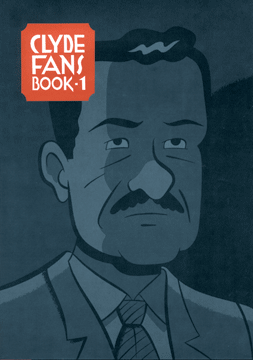
Clyde Fans is a graphic novel by Canadian cartoonist Seth.
George Sprott: (1894–1975) is a graphic novel by Canadian cartoonist Seth, published in 2009.

Canadian comics refers to comics and cartooning by citizens of Canada or permanent residents of Canada regardless of residence. Canada has two official languages, and distinct comics cultures have developed in English and French Canada. The English tends to follow American trends, and the French, Franco-Belgian ones, with little crossover between the two cultures. Canadian comics run the gamut of comics forms, including editorial cartooning, comic strips, comic books, graphic novels, and webcomics, and are published in newspapers, magazines, books, and online. They have received attention in international comics communities and have received support from the federal and provincial governments, including grants from the Canada Council for the Arts. There are comics publishers throughout the country, as well as large small press, self-publishing, and minicomics communities.
Seth’s Dominion is a 2014 National Film Board of Canada animated/live action documentary directed by Luc Chamberland about the Canadian cartoonist Seth.
Joe Ollmann is a Canadian cartoonist. Ollmann's cartooning style has been described as "scratchy angular angry big steaming slice-of-life comics” and the cartoonist Seth has called Ollmann “one of our medium’s great writers.”













